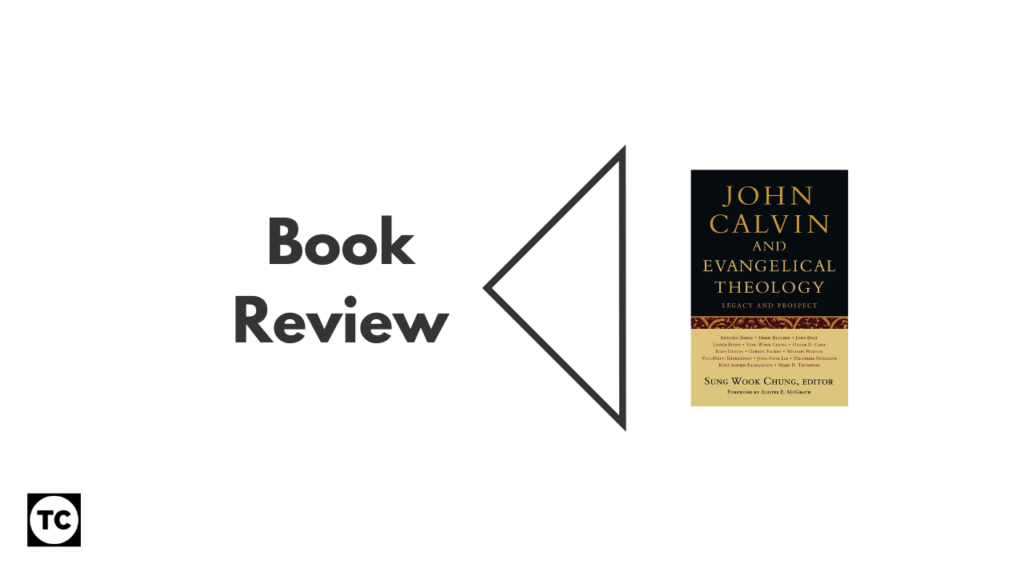
Today I’m reviewing another multi-contributor volume, in this instance one from a few years ago (2007) about one of my biggest theological influences and his impact on the theological movement I tend to find myself in. ‘John Calvin and Evangelical Theology: Legacy and Prospect’ is a compact paperback from Westminster John Knox, edited by Sung Wook Chung, and covering a wide range of theological issues with a particular eye on a) whether Calvin has influenced evangelical theology and b) what his influence could look like going forward. The volume contains some excellent essays, and in my view there were no stand-out duds, which is impressive.
After a good foreword by McGrath, and a helpful introduction from Chung, Horton’s opening chapter examines ‘Knowing God: Calvin’s understanding of revelation’. A robustly reformed chapter which focuses particularly on the Word of God, and that preached. Richardson’s Trinitarian chapter is helpful. “Christology is always nearby in Calvin’s thinking”. Ultimately a classical Trinitarianism is in view. Helpful for showing ‘how’ Calvin articulated his doctrine of the Trinity. Crisp’s chapter on Calvin and Creation and Providence is excellent. Typically Crisp in concision and clarity, with some excellent footnotes. Blocher’s chapter on Calvin’s Theological Anthropology is an excellent summary of a complex theme. “Contrasting emphases, and yet a deep unity of purpose”. Readable and impeccably referenced – some pages being a 25/75 split of body/footnotes! Lanier Burns examines ‘From Ordered Soul to Corrupted Nature: Calvin’s View of Sin’. A readable and workmanlike chapter, interlacing nicely with other doctrines. A helpful redirection to Grace.
Mark D. Thompson writes a typically clear peice on ‘Calvin on the Cross of Christ’. “He knew that this priestly work of Christ is the principal point on which our whole salvation turns”. Focused primarily but not exclusively on the Institutes. Elias Dantas gets the daunting task of pneumatology and meets the challenge well. A straightforward chapter showing how Calvin integrates Pneumatology throughout. Fackre’s chapter on justification initially appears to take a misstep by adding ‘an ecumenical lens’, but he recovers. An interesting chapter, which broadens the utility of the book. “The vision of a genuine ecumenicism will be diminished if the evangelical voice is not heard. For evangelicals, Calvin’s full-orbed understanding of justification… is an important entry point into the discussion”. “Calvin can be viewed as a theologian of the cross, especially in relation to his doctrine of sanctification”. Sung Wook Chung offers a very helpful article with still-timely application to evangelicalism, on ‘Calvin’s Cross Theology of Sanctification’. Antonio Carlos Barro’s ‘Election, Predestination and the Mission of God’ is a helpful approach to “the major and most important theme of Calvin’s theology” yet interestingly “from a missiological perspective”. Helpful potted Biblical Theology too. Slightly odd conclusion.
Jung-Sook Lee examine Calvin’s ministry in Geneva. Helpful reflections on the fourfold office. Key takeaway in my view for churches is around importance of thick and ordered community. Dieumeme Noelliste has the intriguing title ‘Exploring the Usefulness of Calvin’s Socio-Political Ethics for the Majority World’. A fascinating piece that offers up some useful principles for praxis. John Bolt writes ‘“A Pearl and a Leaven”: John Calvin’s Critical Two-Kingdoms Eschatology’. This is a careful and wide-ranging essay, touching on Bavinck, Moltmann and Barth, that I’ll certainly revisit. A helpful reminder of the primacy of evangelism and the importance of other things. It remains “a needed corrective for the church today”. Veli-Matti Karkkainen closes out the volume with ‘Calvin and Religions’. A typically intriguing peice form VMK – with plenty for further thinkers to look into. Calvin arguably a theologian of his time – though with a possible openness towards natural theology, and an awareness of ‘Christian’ faiths being as dead-ended as, e.g. Islam. A fascinating note to end the volume on.
Overall, this is a volume well worth reading if you have interest in Calvin and/or evangelical theology. The evangelicalism in play here is Bebbingtonian and global (the volume appears to have a relatively diverse set of contributors, both ecclesially and demographically speaking), and most of the essays have sparked new ideas for me, or helped me clarify things. With regard to Calvin, the volume serves as a tribute to his ongoing relevance, a reminder to read both the Institutes and his commentaries (as well as other works such as his Psychopannychia), and the ever present caution that it is better to read Calvin than about Calvin. For evangelicalism, this book will be primarily of interest to historical and systematic theologians, though I think pastors would find the chapters by Horton, Thompson, Lee and Bolt helpful. I’d recommend giving this book a chance if any of the topics outlined above are relevant, and more generally in terms of an example of a good edited collection. 4/5
Leave a Reply